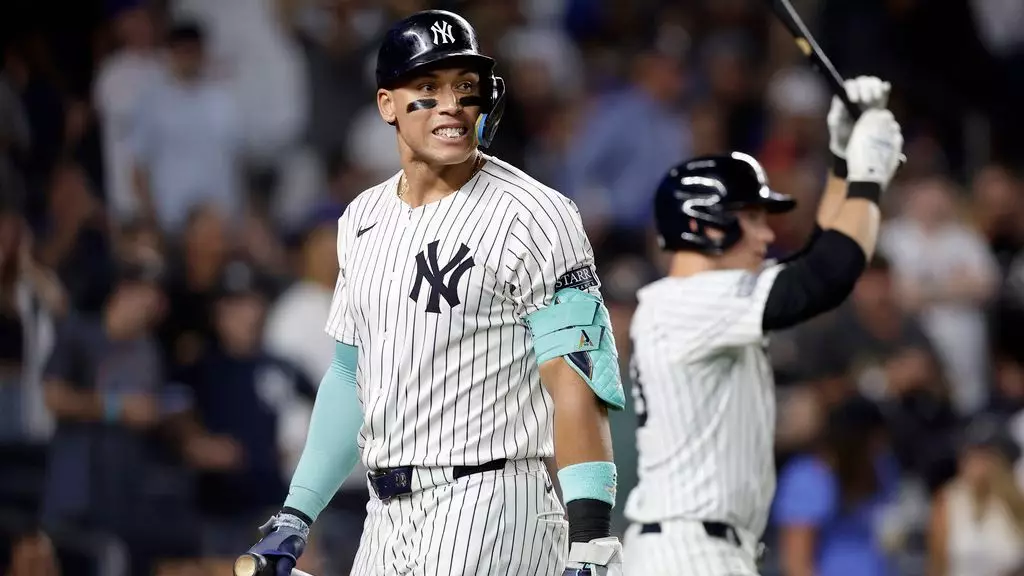In the highly competitive landscape of Major League Baseball, teams constantly look for an edge in strategy to outmaneuver their opponents. A vivid illustration of this was captured in the recent matchup between the New York Mets and the New York Yankees, where the Mets adopted a cautious and innovative approach to handle one of baseball’s most formidable hitters: Aaron Judge. On this particular evening, the Mets’ front office and coaching staff meticulously crafted a game plan that paid off, resulting in a narrow 3-2 victory at Yankee Stadium. This article will analyze the strategies employed, their implications for both teams, and Judge’s performance in the context of this intense rivalry.
The core of the Mets’ strategy was straightforward: avoid engaging with Judge at all costs. This tactic was executed to perfection, leading to Judge being walked a total of four times during the game, with the last being intentional. The decision to sidestep the slugger was evident, aimed at neutralizing his impact while placing the burden of performance on less-productive segments of the Yankees’ batting lineup.
The execution of this strategy raised questions about the Yankees’ ability to capitalize when their star player is intentionally sidelined. With Judge continually watched, the burden fell onto players like J.D. Davis, who was unable to make an impact during critical moments, striking out twice and grounding into a double play. This pattern underlined the Yankees’ challenge: without consistent offensive contributions from players beyond their elite prospects, they could struggle against well-prepared pitching rotations.
While intentionally walking a dangerous hitter such as Judge might seem advantageous on the surface, this tactic carries inherent risks. The Mets’ decision to walk Judge, especially during moments when the game could shift in the Yankees’ favor, presented an opportunity for the other players to establish their potential.
In the seventh inning, the Mets chose to walk Judge with one out and a rookie pinch-hitter, Ben Rice, stepping up to the plate. Despite a valiant effort, Rice could not take advantage of the opportunity and simply flew out after an eight-pitch battle. This illustrates how the Yankees’ reliance on Judge might have become a double-edged sword: his absence from the scoring equation meant that other players must step up—an expectation that ultimately fell short.
Judge’s statistics this season speak volumes about his prowess, but the spotlight on his performance against the Mets boiled down to an unusual experience. He ended the night without a hit, ending the game with four walks and a strikeout. Despite this, he acknowledged the team’s game mentality, emphasizing that winning is a collective effort irrespective of individual accolades.
Judge mentioned, “I wouldn’t mind that day when it comes with a win. It’s part of it. It’s a team game.” This statement underscores the necessity of teamwork and adaptability in the major leagues, especially critical during tight matchups where star players might be unable to fully engage due to strategic decisions by opponents.
Manager Aaron Boone’s ongoing efforts to shuffle the Yankees’ lineup emphasized a bid for adaptability in utilizing available talent effectively. However, as Judge and Soto continue to shoulder much of the performance pressure, finding reliable support within the middle order becomes paramount. The Mets can certainly capitalize on this systemic misalignment, presenting a challenge the Yankees must resolve as the season progresses.
As the season unfolds, the complexities of these inter-league matchups will only heighten, with teams continuously adjusting and recalibrating their strategies in bid for victories. The Mets secured a pivotal win on this occasion, demonstrating that a thorough strategy and collective effort could subdue even the most electrifying talents in the sport.
In the high-stakes arena of Major League Baseball, bold decisions and strategic nuances define outcomes. The Mets successfully proved that thoughtful planning against rival star players, like Aaron Judge, pays dividends, albeit not without its own ramifications. Ultimately, as both teams enhance their approaches, one thing remains clear: the beauty of baseball lies not only in individual brilliance but in the wisdom of collective effort and strategy in a team-oriented sport.


Leave a Reply